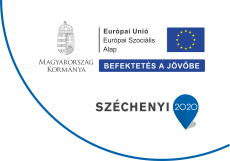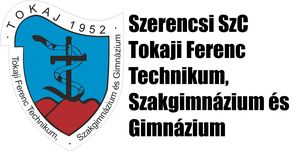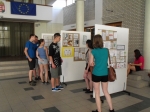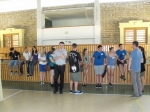In our school a really special program started this morning: the 16th International Junior Eco-Expert Project. It means that for four days local students work together with other students coming from Poland, the Czech Republic, Slovakia and Austria.
After a short opening session the almost 100 participants made 6 groups and spent the whole day with the members of their team. There’s another group, the 7th, which is the media group. Its task is to help our guests and to document their daily programme. Today every group had a different programme. The groups went cycling, walked on the bank of Bodrog and in the town centre, climbed Tokaj’s famous hill, visited Tarcal, tasted the amazingly popular wine and started to collect data for their main project, because every team has a topic, which will be presented on Thursday.
In the afternoon the students listened to a lecture which was about our region, Tokaj’s wine types, about the preparation methods and the importance of wine tourism. Finally, closing this interesting day, the foreign students could learn a typical Hungarian dance. This day was an amazing start of a really good and exciting week.
According to the students Tokaj is a wonderful place and apart from their tiredness they really enjoyed their first day here. Furthermore, they are excited and enthusiastic about the project.
Some participants shared their experiences:
We were with group number1 for all day. After breakfast we went with one ornitologist to walk around Tokaj vineyards. The main aim of the excursion was to watch and observe species of birds and flowers. From birds we saw for example hoopoe (Upupa epops), bee- eater (Merops apiaster).
After lunch we moved to river Bodrog and acceded to canoes with which we rowed on the river. We visited cut- off meanders and we watched for animals like: grey herons, kingfishers, night herons, white-tailed eagles and buildings of European beavers.
„Today as participants of group2 we had the chance to visit the Oenology Research Centre of Tarcal and a winery which belongs to this organisation. The students could much information about wine and the local wineries. We started our day at the company. We saw some vineyards and got to know some interesting things, moreover we could see some rudimentary devices. We also learnt about how our ancestors treated the grapevines. After that we continued our trip to the cellar and we were offered to taste the world-renowned wine during our visit in the several kilometres long cellar. As we were coming to Tokaj, we stopped to see some very special types of grapes. The tour leader helped us with everything and tried to share some valuable things. This was the first day and we hope that our week will continue as good as it was today.”
In the morning group 3 travelled by bus to the waste disposal of Bodrogkerestúr. This waste disposal manages the waste of 81 towns and villages. The trucks collect the waste and come to the arrival container. There the trucks are weighed and the drivers fill out a waste sheet, this includes the day of arrival, the weight and the region where the waste comes from. Then the waste gets selected in two phases. The plastic, paper and glass collected separately gets selected and put to a bigger waste disposal. And the other selection (concrete waste) gets crushed and gets buried in the landfield.
It was very interesting and the group enjoyed it.
This afternoon Mr. Gergely Somogyi gave a speech on the current challenge and future directions of the Tokaj wine region. He briefly introduced the Tokaj wine region and its history since 1517 when people here first found the method of producing Aszú. In 2002, Tokaj wine region became one of the UNESCO World Heritage Site as Cultural Landscape.
After some introduction of different varieties of grapes and wine, the expert stated the necessity of combining work of both nature and people in wine industry in this region in finding a sustainable way of development. He told us about the challenges nowadays such as the profit of wine-making cannot really meet the expense of cultivating; the lack of job opportunities for people in industry; and the aging and decreasing population is also a serious problem. As a region of World Heritage, there is a better way to have a sustainable future than simply industrialization. First, always base on wine-making tradition to keep quality. Secondly, rebuild the Tokaj brand, rise the price to get more income. And third, change the working system to make more job opportunities. Mr Somogyi gave us a successful example to prove the feasibility of this sustainable developing direction. What’s more, he also showed some wine-related products and industries that may create more opportunities of development of the whole region.
In this speech, he mentioned the simple industrialization which ignores the value of World Heritage Site and sustainability. It can be the worst choice of future. The exploitation of nature has already caused a lot of serious environmental problems and climate change in the world. Prosperity should last long. The cooperation of nature and humankind is the most important concept in 21st century all around the world. As the ancient wisdom of Tao Te Chin says: Man is an integral part of nature. Mr. Somogyi has given some feasible ways of sustainable development in Tokaj wine region. There must be a bright future of this region in the coming years.




